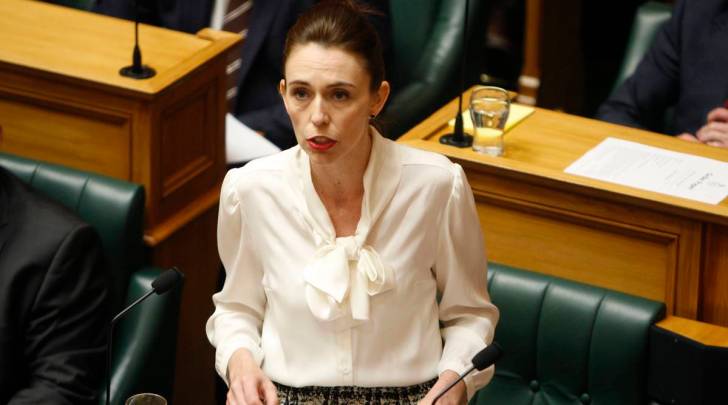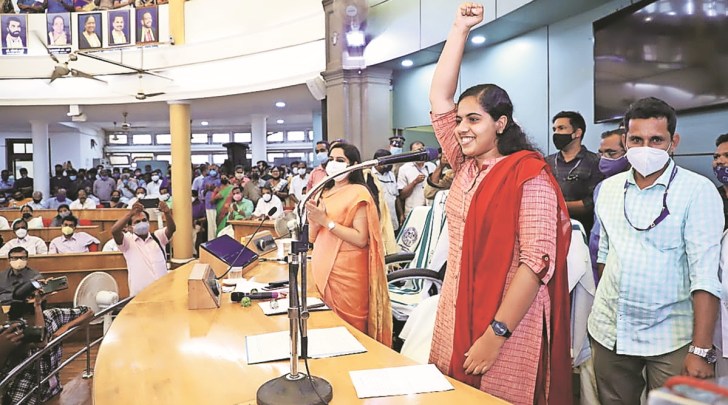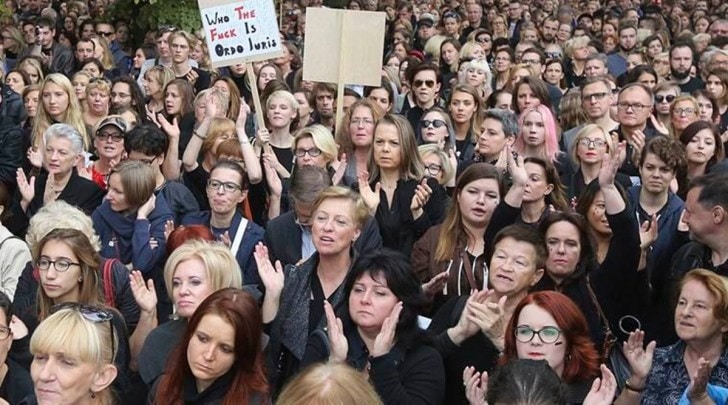A global crisis often exposes structural flaws in the way a society functions, magnifies inequalities and impacts certain groups disproportionately. The Covid-19 pandemic, says Melinda Gates, impacted women unduly and “women were twice as likely to lose their jobs as men”. Apart from the economic impact of the crisis, issues like domestic violence and abortion rights took centre stage. With lockdown and quarantine measures in place, a “horrifying surge” in domestic violence was recorded this year, mainly due to women being trapped with their abusive partners.
The year 2020, however, also showcased women’s stories of resilience and strengthened their resolve to fight harder for their rights. It provided opportunities to break barriers like never before. As the novel coronairus swept the planet rapidly, healthcare workers, a sector that is made up of over 70 per cent women, nursed the world from the frontlines. Despite dominating the sector, women only hold 25 per cent of senior roles in it. “If there was a time when we truly need to step up progress for women in leadership in global health, this is it,” said WHO Director General Tedros Adhanom Ghebreyesus.
From women leaders’ meticulous handling of Covid-19 in their countries, to legal wins for women rights and to some surprising firsts, we look at some of the defining moments for women this year.
Handling the Covid-19 crisis
The coronavirus pandemic shed light upon female leadership like never before. According to data, countries led by women suffered six times fewer Covid-19 fatalities as compared to countries led by men. Women led countries were also more effective and rapid in flattening the case curve.
Germany, under Angela Merkel, had a far lower fatality rate than Britain, Italy, France as well as Spain. Taiwan under the leadership of Tsai Ing-wen led one of the most successful efforts in containing the virus. With an early introduction of effective testing, isolation of the vulnerable population and enforcement of face coverings, Taiwan brought the crisis under control without having a nationwide lockdown.
 New Zealand Prime Minister Jacinda Ardern also unveiled the world’s most inclusive parliament in terms of gender, ethnic minorities and indigenous representation.. (AP Photo/Nick Perry)
New Zealand Prime Minister Jacinda Ardern also unveiled the world’s most inclusive parliament in terms of gender, ethnic minorities and indigenous representation.. (AP Photo/Nick Perry)
New Zealand, too, had much shorter lockdown as compared to its pacific neighbour countries and became the first country to eliminate Covid-19 temporarily. No other leader has brought female political representation to the forefront this year like New Zealand Prime Minister Jacinda Arden. In a landslide victory won by her party in the country’s 2020 elections, more than half the seats belonged to female candidates. Arden also unveiled the world’s most inclusive parliament in terms of gender, ethnic minorities and indigenous representation.
Despite these significant victories, the political empowerment gap for women still continues to be the largest gender disparity gap. With a global average of just over 25 per cent, it would take over 99 years to bridge the gap between men and women globally, according to the IPU Gender Equality Report.
Women who broke barriers this year
The paragon of many firsts, US Vice President-elect Kamala Harris will cover several pages in history by becoming the first Black, first Asian-American and first women to break “one of the most substantial barriers” in America. In her acceptance speech, she hailed women “who fought and sacrificed so much for equality, liberty, and justice for all, including the Black women” as the backbone of America’s democracy.” “While I may be the first woman in this office, I won’t be the last,” she added.
The Time magazine’s first-ever “Kid of the Year” title went to Gitanjali Rao, 15, a teenage scientist and inventor who created a device that identifies lead in drinking water, an app that prevents cyberbullying and she further aims to use technology to offer solutions for vaccine distribution amid the pandemic.
In an interview, Rao said she aims to represent all young scientists and innovators in the world. “If I can do it you can do it too.”
 Arya Rajendran, a 21-year-old college student and CPM leader, took oath as Thiruvananthapuram mayor Monday. (Express photo: Sanjay Mohan)
Arya Rajendran, a 21-year-old college student and CPM leader, took oath as Thiruvananthapuram mayor Monday. (Express photo: Sanjay Mohan)
Arya Rajendran, 21, became India’s youngest mayor who is set to lead the Thiruvananthapuram City Corporation in Kerala. Rajendran, currently a college student joined politics and got associated with her party (CPM) from the age of 5. In her tenure, she aims to prioritise issues pertaining to waste-management. The 2020 local elections in Kerala saw a number of young women candidates and women students enter politics. Their aim – to focus on issues of development and change the way people perceive politics.
From the Shaheen Bagh protest site against the citizenship law in India to the Time Magazine’s “The 100 Most Influential People of 2020,” the 82-year-old Bilkis showed that age or gender did not matter in front of resilience. She along with several elderly and young women protesting at the site became symbols of resistance and hope.
Abortion rights
After almost five years of mass protests by Argentina’s pro-choice women advocates, the country in a landmark vote legalised abortion on Wednesday, becaming the largest nation in Latin America to do so. The impact of this historic victory will be felt in the region and add momentum to the abortion rights movement gaining ground across the world.
 It was the latest of a series of demonstrations that have sprung up in Poland after a high court ruled to tighten the country’s already restrictive abortion law in late October. (AP)
It was the latest of a series of demonstrations that have sprung up in Poland after a high court ruled to tighten the country’s already restrictive abortion law in late October. (AP)
Earlier this year, Poland saw hundreds of thousands of women of all ages on streets protesting against a court’s near total ban on abortion. Braving tear gas cannons and harsh police tactics, polish women continue to stand strong in their fight against the conservative influence of the catholic church on their society and their rights.
Saudi allows women to travel independently
Putting them on an equal footing with their male counterparts, women in Saudi Arabia were allowed to travel abroad without a male guardian’s permission. In a new law passed in August, women over the age of 21 could apply for a passport and travel abroad without the permission of their male caretakers. Although Saudi Arabia has a long way to go in terms of women’s rights, the kingdom has eased some long standing restrictions and recently granted women the right to register birth, marriages or divorces on their own.
Sierra Leone revokes ban on pregnant women attending schools
The West African country in March finally lifted the discriminatory and internationally criticised ban that did not allow pregnant women to attend schools or undertake exams. This historic victory will allow thousands of girls in Sierra Leone to complete their education each year. The Economic Community of West African States (Ecowas) court has also ordered Sierra Leone to form infrastructure and policies for helping pregnant women return to school. The ruling has shed light on multiple issues faced by women in the African continent, including child marriage and women’s education.
Resolve against Female Genital Mutilation(FGM)
While the practise of Female Genital Mutilation(FGM) — involving removal of outer female genitilia for non-medical reasons — is still widely prevelant across the world, a few countries this year took steps to recognise the ramifications of the procedure and sought solutions to slowly end it. According to UNICEF data as of February 2020, at least “200 million girls and women have been cut in 31 countries.”
In a major step forward for women’s health and rights, Sudan criminalised FGM and the new laws passed in July made it punishable by up to 3 years in jail. This was hailed as a major breakthrough in a country where 87 per cent of women have undergone FGM. Another positive development coming from Sudan was the nation’s authorities announcing steps to end child marriage and adopt all articles in the African charter on the rights and welfare of the child.
Finland too voted to intensify the country’s laws against FGM in November to make them more unequivocally enshrined in Finnish constitution. Recognizing that Covid-19 could stall efforts to prevent and eliminate FGM, United Nations in May passed a resolution on the “Elimination of Female Genital Mutilation” and urged nations to “stop the medicalization” of the practise. UNICEF has pledged to end FGM and child marriage by 2030.
Denmark criminalises sex without explicit consent
Denmark strengthened its rape laws and became the 12th country in Europe to criminalise sex without consent in December. Through a new law passed in its parliament, the country recognised non-consensual sex as rape and also widened the circumstances that could constitue as rape.
This article is auto-generated by Algorithm Source: indianexpress.com


